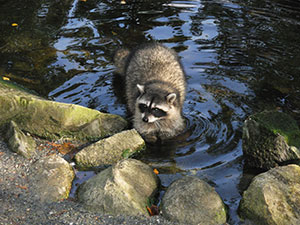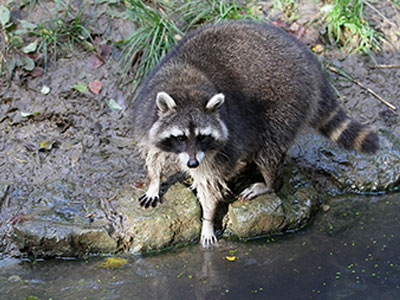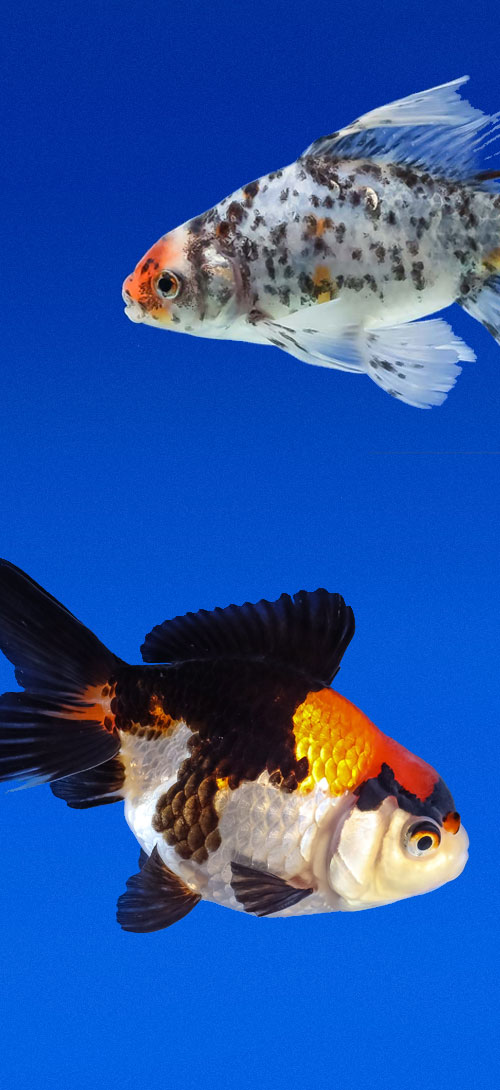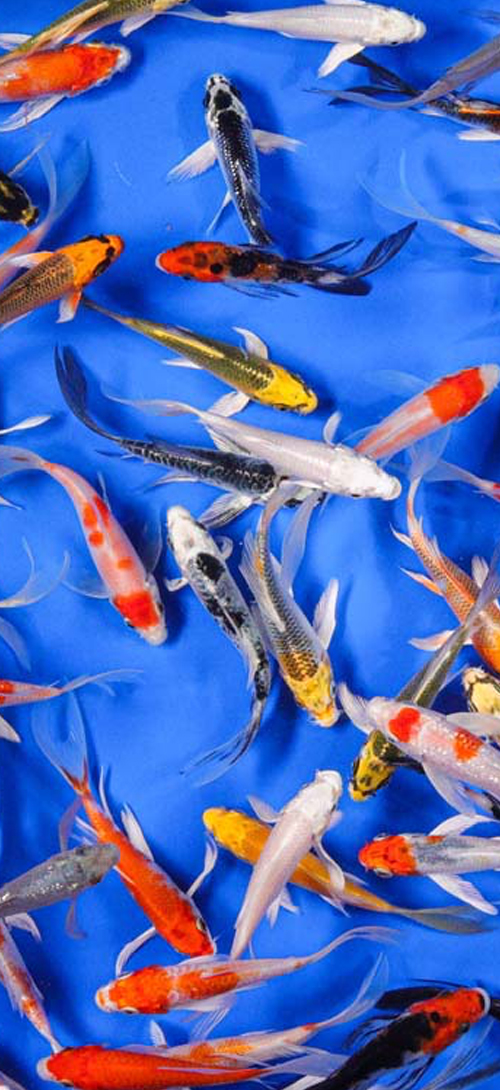Koi Fish Facts
Koi Pond Predators: Raccoons
The raccoon tends to receive a mixed reputation, as some people appreciate its cuteness, while others consider it a nuisance. If you are a koi enthusiast with an outdoor pond, chances are you fall into the latter category. Raccoons are easy to please when it comes to food–they are omnivores that will eat almost anything–and this makes them a danger to your koi pond. A hungry raccoon won’t miss an opportunity for a fishing trip in your backyard.
Fortunately, raccoons are relatively innocuous in the realm of koi pond predators. In many cases, you can prevent the problem by taking proactive steps to ensure you are not attracting raccoons and by designing your pond in a way that greatly reduces their aquatic hunting capabilities. There also exist several options for banishing the masked bandits if they’ve discovered your pond. However, raccoons are not a threat to be taken lightly, and they should be actively avoided in order to keep your koi safe.
Raccoon Basics
The raccoon is one of the country’s most recognizable critters. That’s because raccoons are ubiquitous across the United States and Mexico, as well as several parts of Canada. Whether you dwell in the city, suburbs or country, chances are there’s a raccoon not too far away. Often confused with rodents, the masked mammal actually belongs to another genus of nocturnal animals: procyon.
A full grown raccoon reaches a formidable size, weighing up to about 23 pounds and spanning up to 37 inches long. The raccoon has gray to brown fur, with a trademark black mask around its eyes. A raccoon’s tail is bushy, displaying black rings and measuring up to 16 inches. Raccoons have paws with five toes that enable them to climb easily. They also are excellent swimmers and enjoy searching for food in the water.
The lifespan of a raccoon in the wild is one to three years–compared with the potential to live 20 years in captivity–as most fall victim to predation, disease or moving cars at a relatively young age. A raccoon’s main predators include bobcats, foxes, coyotes and owls.

Detecting Raccoons
Though raccoons will come out at any time of day if there’s a ready meal available, they are nocturnal by nature and typically hunt at night and sleep during the day. If you are out to catch a raccoon red handed, the hours between dusk and dawn are your best bet, especially in the warmer months. Raccoons give birth in the spring, so that’s the time of year to be most vigilant, as they will be on the prowl for extra food for their young. They will continue to gorge themselves throughout the summer to store up body fat in preparation for sleeping in their dens through much of the winter.
If you’ve had fish that have gone missing, a number of animals could be to blame. However, if raccoons are the culprit, the good news is that these creatures are not subtle animals. In most cases, you will know if you have raccoons prowling around. Some telltale signs include upended garbage cans, overturned rocks or flower pots, decimated gardens or pond lilies, and scattered yard tools. They also will leave tracks in wet soil around the pond.
Preventing Raccoons
If you haven’t yet had a problem with raccoons coming near your pond, you almost certainly will at some point if you don’t keep your garbage cans sealed. The same is true if you leave out bird feeders overnight or keep unemptied food bowls for your pets outdoors. Unfortunately, once the word has gone out in the raccoon community that your house is the newest sushi hotspot, you will probably continue to have problems with raccoons feasting on your fish. And by the time you become aware that you’ve been invaded by a raccoon, it may already have snatched several of your living jewels.

Any koi enthusiast will learn quickly that sloping banks on a pond are like open invitations for wildlife to explore.If you are in the planning stages of a pond, you should design your pond with predators in mind, including raccoons. Though they are able to swim, a raccoon that isn’t starving is unlikely to dive into a deep pond to chase fish. Raccoons catch fish with their lightning-speed paws and sharp claws, so it is far more difficult for them to hunt and swim simultaneously. When designing your pond, make sure the water edge immediately drops at least one or two feet in depth.
Repelling Raccoons
Once you’ve determined that you have a raccoon problem, several solutions exist to prevent damage to your pond and to ensure your koi’s safety.
Netting is one of the top strategies enthusiasts employ to keep raccoons out of their ponds. You can put a net over your pond at night when raccoons are most likely searching for a snack. Be sure to hold it down with heavy rocks or stakes.
Another way to deter raccoons from your property and your pond is to install solar-powered LED lights, which, when activated at night, mimic to a raccoon the red eyes of its predators.
Installing an electric fence is a more cumbersome, yet highly effective, option. If you are looking to save money and avoid disrupting the aesthetic, a single wire about six inches off the ground can keep raccoons out in many cases. An additional wire one foot off the ground will hamper any persistent racoons. You can install electric-fencing systems that are equipped with programmable timers, so that the fence automatically activates at night.
Alternatively, you can create your own wire-covered pond frame using chicken wire with holes less than an inch in diameter. It should be cut to the shape of your pond and put on the surface of the water.
One of the simplest options, as long as you do not have pets or children that play in the yard, is to sprinkle hot sauce around the perimeter of the pond. You can create a homemade cayenne pepper spray combining hot sauce with water and spraying liberally all around the pond.
Trapping Raccoons
If attempts to scare raccoons off or restrict access don’t work, you may consider purchasing a small animal trap to catch and relocate them. However, there are several things to consider before you decide on this approach.
First, you need to check your state’s regulations, as the catch and release of raccoons may not be legal in your state. Second, you should avoid trapping raccoons during the spring, as they could be rearing babies back in their dens.
Another thing to consider is that relocation is incredibly stressful on the animal, and many raccoons die within the first two weeks of being released into a foreign territory. (You need to take the raccoon at least five to 10 miles from the capture site, or else it will find its way back.) Never leave the animal in the cage for too long, as it increases risks. Stress will dehydrate the raccoon, so you can try placing some water in the cage while you are transporting it. Also drape a cloth or towel over the trap, which will help to keep the raccoon calm.
The best traps for raccoons are large traps, ranging from about 32 to 42 inches in length. Place the trap near your pond in an area where you’ve seen raccoon damage. Bait the trap with a sweet food such as marshmallows or watermelon. Each trap sets differently, so follow the instructions that come with yours. It is very important to check your trap regularly to maximize the chance that the animal will survive.
Raccoons are adorable animals that can wreak havoc on your living jewels. Best efforts should be taken to avoid attracting them to your pond, but netting and relocation can be helpful solutions if you develop a problem with this agile predator.




